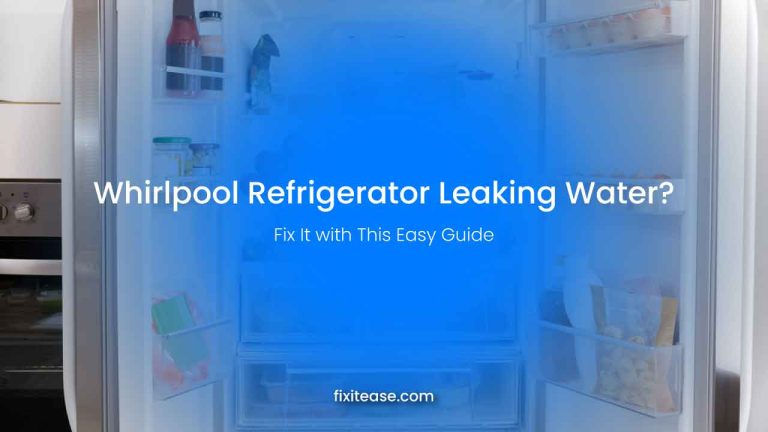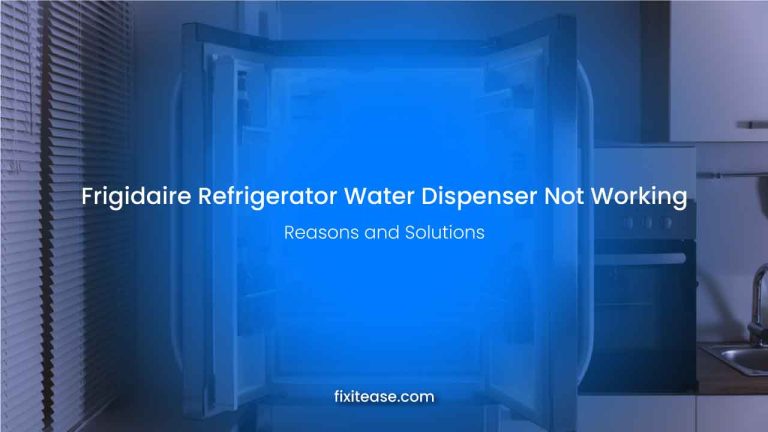How to Fix Your LG Refrigerator Leaking Water?
Your LG refrigerator is an indispensable home appliance, ensuring your food stays fresh and your drinks remain cold. Yet, even the most dependable appliances can develop issues over time, and a common concern is a leaking refrigerator.
This frustrating problem may occur due to a loose or damaged water line, and in some cases, a faulty water inlet valve. An improperly fitted water filter or a damaged filter housing can also contribute to the issue.
But whatever it is in the following sections, we’ll know the specifics of each of these issues and guide you through the process of resolving them.
Why Is Your LG Refrigerator Leaking Water?
Leaking water in LG refrigerators can be attributed to various factors, affecting both newly acquired and older appliances. The source of the issue may differ, but the method to resolve it largely depends on the specific cause.
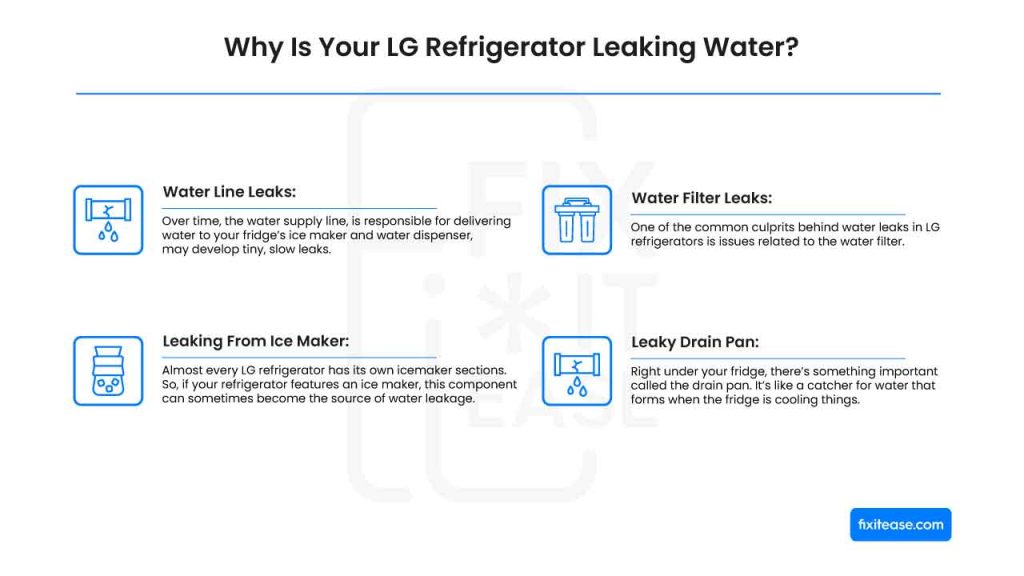
Whether you have recently purchased an LG refrigerator or have been using it for a while, these potential triggers for water leakage are essential in effectively addressing the problem-
Water Line Leaks:
Water line leaks in your LG refrigerator can manifest as a concerning issue.
Over time, the water supply line, is responsible for delivering water to your fridge’s ice maker and water dispenser, may develop tiny, slow leaks.
These leaks can often go unnoticed until they accumulate, resulting in unsightly water puddles on your kitchen floor.
It’s crucial to regularly inspect the water supply line and address any leaks promptly to prevent water damage and maintain the functionality of your refrigerator.
Leaking From Ice Maker:
Almost every LG refrigerator has its own icemaker sections. So, if your refrigerator features an ice maker, this component can sometimes become the source of water leakage.
The issue may stem from a malfunctioning ice maker or problems with its water supply mechanism.
When the ice maker malfunctions, it might release water into the freezer or surrounding areas, causing both inconvenience and potential damage.
In that case, you must ensure that your ice maker is in good working condition and its water supply is properly connected which prevents such leaks.
Water Filter Leaks:
One of the common culprits behind water leaks in LG refrigerators is issues related to the water filter. There are several factors that can contribute to this problem, and understanding them is crucial for effective troubleshooting.
Water filter-related leaks can stem from things like improper installation, a filter screen clogged with debris, a malfunctioning filter, or the use of a non-OEM ( Original Equipment Manufacturer. ) filter – that’s a filter not made by LG, the original manufacturer.
If your water filter is either not installed correctly or has become obstructed, it can lead to unwanted water leakage.
This isn’t just an inconvenience, it can impact the functionality of your refrigerator and even the cleanliness of your kitchen.
To tackle this issue, it’s essential to opt for a genuine LG water filter and make sure it’s installed properly. This can go a long way in preventing those troublesome water leaks.
Leaky Drain Pan:
Right under your fridge, there’s something important called the drain pan. It’s like a catcher for water that forms when the fridge is cooling things.
But if this pan gets hurt or if the tube connected to it falls off, water might escape onto your kitchen floor. To stop this from happening, you need to regularly check and take care of the drain pan and the stuff around it.
This way, your fridge can work well, and your kitchen floor stays in good shape.
How to Fix Your LG Refrigerator Leaking Water?
So, if you’re not sure why your LG refrigerator is leaking water, don’t worry. You can follow these simple steps one by one to find out and fix the problem. Here’s what you can do:
Step 1: Track Down the Leak
To get started, you need to find out where the water is coming from. Is it dribbling out from the front, sneaking out at the back, or creeping from underneath your fridge?
Some other leaking options are-
- Defrost drain leaks
- Leaking from the ice maker
- Water filter leaks
- Water inlet valve leaks
- Dispenser leaks
- Condensation drain holes
Knowing where the leak originates helps us tackle the issue half of the task done.
Step 2: Inspect the Water Line
Now, let’s examine the water supply line. This line is like a pipeline that brings water to your fridge’s ice maker and water dispenser. Look closely for any visible leaks, dents or damages.
You can first start looking underneath the freezer part of your fridge, take a look beneath the produce bin, or even peek behind the whole refrigerator. This is where you want to start your search for leaking.
If you spot problems, you may need to fix or replace the line. But don’t forget to turn off the water supply first before you get your hands dirty.
Step 3: Investigate the Ice Maker
If the water is trickling from the ice maker, it’s time for a closer look. Check out the water supply line leading to the ice maker. If it’s in bad shape, swap it out for a new one.
Also, give the ice maker itself a thorough once-over. Look for signs of leaks or any hiccups in its operation. If things look fishy, don’t hesitate to call a professional for help.
Step 4: Examine the Drain Pan and Tube
Right under your refrigerator, there’s something important called the drain pan. It works like a catcher’s mitt to collect water that appears when your fridge is cooling.
Think of the drain tube as a little straw that carries this water away. But if the drain pan gets hurt or the straw isn’t connected correctly, you have to fix it.
This keeps the water from spilling onto your kitchen floor, and your fridge stays happy and dry.
Step 5: Give Your Condenser Coils a Clean-Up
Last but not least, we need to deal with the condenser coils. These are like the lungs of your fridge, helping it breathe and keep things cold.
But when they get dirty or clogged with dust and grime, they can create too much condensation, leading to leaks.
So, unplug your fridge and give those coils a good vacuuming to clear them of any dirt. It’s a simple but effective way to prevent future leaks and keep your LG refrigerator in tip-top shape.
Youtube: [LG Refrigerators] Troubleshooting An LG Refrigerator That Is Leaking From The Bottom
Is Your Water Filter to Blame?
When your LG refrigerator is leaking, it’s often because of problems with the water filter. But before getting into complicated fixes, let’s take it step by step:
First, grab your refrigerator’s user manual. It’s like the guidebook for your fridge. Check if your water filter was installed the right way. If you spot any differences, make adjustments as per the manual’s instructions.
Next, think about a clogged filter like a straw that’s been pinched. It can make your fridge leak. Take out the filter and see if there’s any gunk or blockages. If you find any, give the filter a good cleaning before putting it back.
Lastly, be sure you’re using the right filter. LG recommends its own brand. Other filters might not fit well or might not be as good, and that could lead to leaks. So, stick with the one they suggest. This will help keep your fridge dry and your drinks cold.
Frequently Asked Questions (FAQ)
Is it normal for a refrigerator to leak water?
It’s not normal for a refrigerator to leak water. While some condensation is natural, visible water pooling around or under your refrigerator is a sign of an issue that needs to be addressed.
How often should I clean the condenser coils?
You should clean the condenser coils at least once a year. However, if you have pets or live in a dusty environment, you may need to clean them more frequently to prevent dust buildup.
Should I attempt to repair the refrigerator myself, or should I hire a professional?
The complexity of the repair depends on the specific issue. Simple tasks like cleaning condenser coils or checking for visible leaks can often be done by homeowners. However, for more intricate problems with the ice maker, water supply lines, or electrical components, it’s best to consult a professional.
Conclusion
A leaking LG refrigerator can be a frustrating issue, but it’s one that can usually be resolved with some troubleshooting and maintenance. If you can maintain the above steps, you can identify the source of the leak and take the necessary actions to fix it.

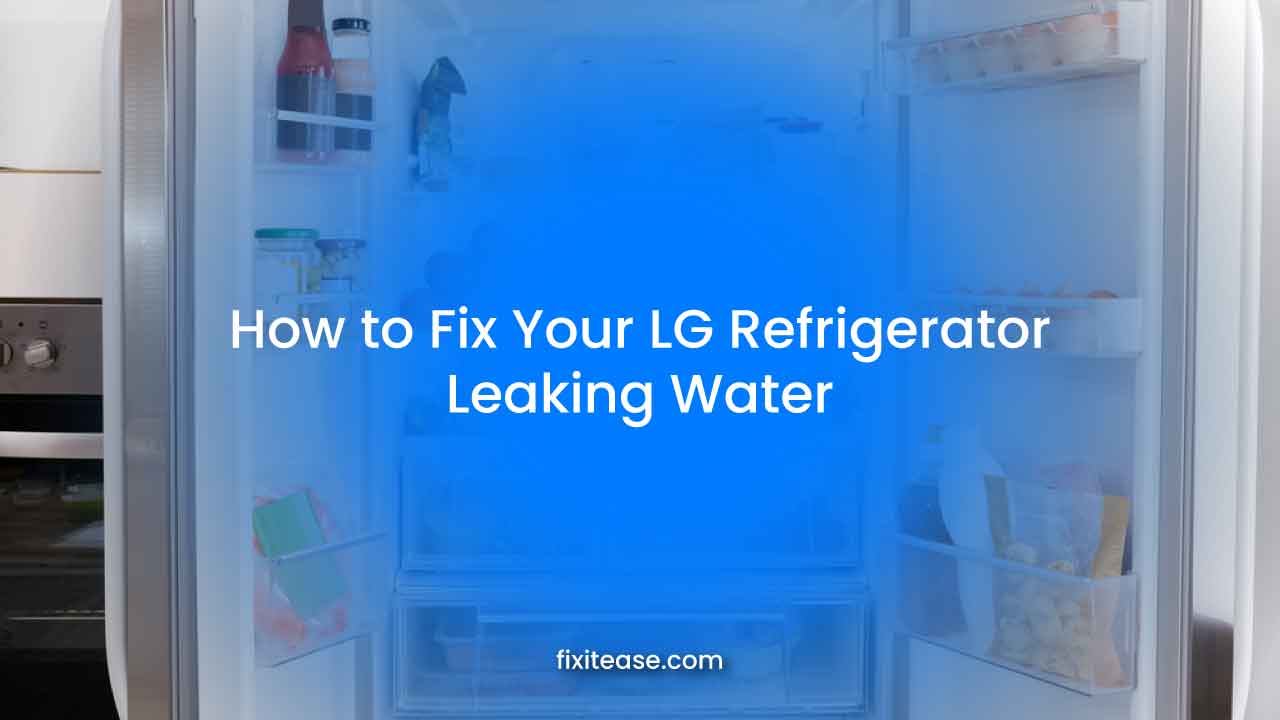
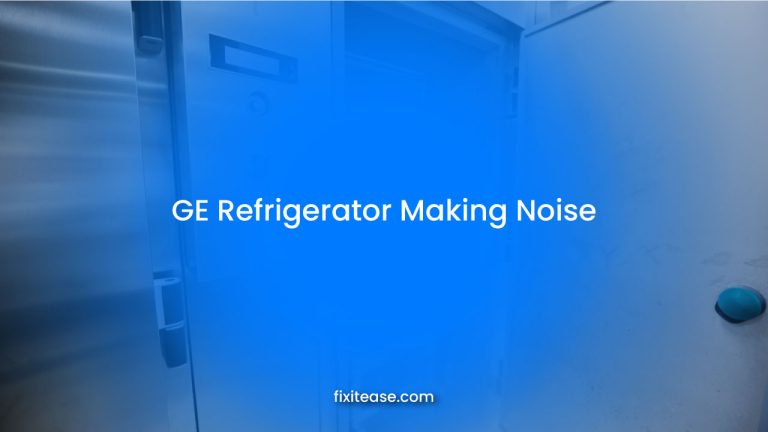

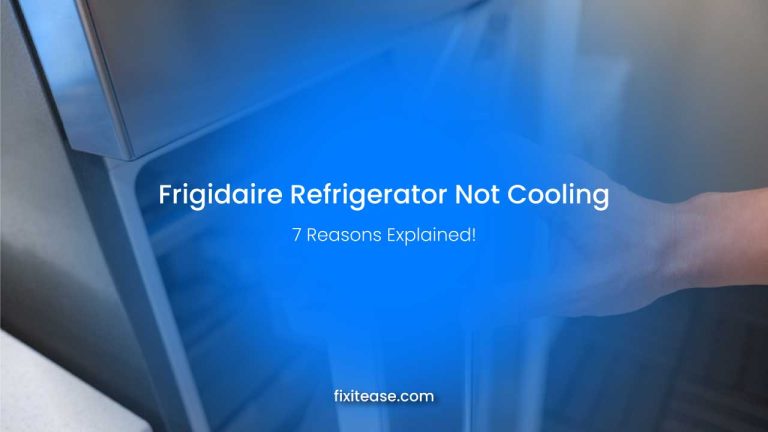
![8 Common GE Refrigerator Problems [With Expert Solutions]](https://fixitease.com/wp-content/uploads/2023/11/Common-GE-Refrigerator-Problems-768x432.jpg)
